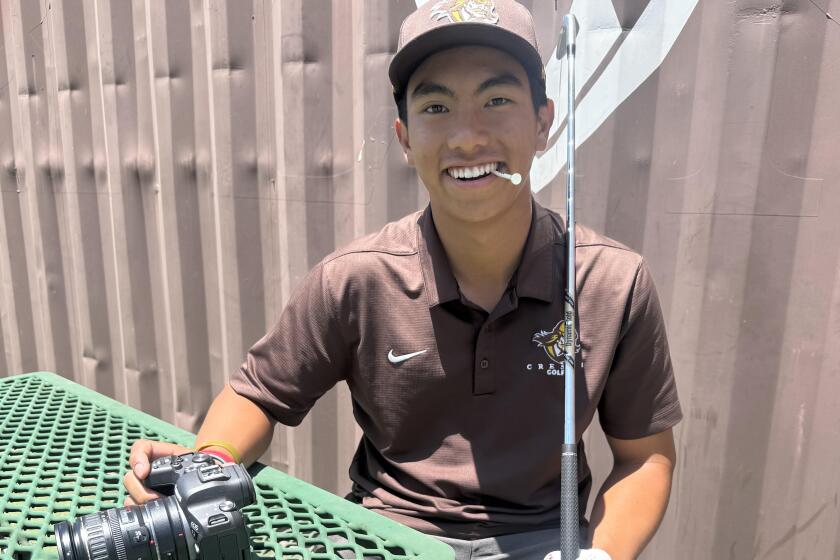An East L.A. classic
- Share via
He could barely walk. But for 35 years, up and down countless city fields, he walked.
He could not play sports. But for 35 years, he participated in every Garfield High football game.
His name is Hrair Shekerjian, and he was a stat man.
For more than three decades, his body ravaged by polio but his heart set on belonging, he carried a clipboard, six sharpened pencils and a breathtaking sense of dignity.
Shekerjian kept statistics on every Garfield football game. He would work home and on the road, always from the sidelines, walking the miles with a painfully pronounced limp, giant glasses fogging up, silver mutton-chop mustache growing slick.
After each game, he would spend hours tallying up the statistics by hand, entering them in pencil and presenting them to the coaches.
The numbers would help players make all-star teams, or receive college scholarships, or be recognized for unseen feats.
The numbers would make heroes of everyone but him.
He was a stat man. And who remembers a stat man?
Then last spring, at age 70, Shekerjian suffered a mild stroke. He was too weak to limp without a cane. He refused to chronicle the games from the stands. He phoned in his retirement. Thank you, goodbye, click.
The stat man had become just another stat.
The first eight Garfield games this season, Hrair Shekerjian sat alone in his cluttered Monterey Park home, watching “Seinfeld” reruns and occasionally praying to a photo of his late wife, Janice.
“All those years on the sidelines, I didn’t think anybody ever noticed me,” he said.
*
It is Thanksgiving week. Hrair Shekerjian is sitting in his home again, only this time he is not alone.
There is a phone ringing in the corner. There are proclamations stacked on the floor. There are dinner plans being made, football games to be attended, a life to enjoy.
What happened?
Sitting on a foam chair to ease the pain in his hip, the stat man shook his head.
“I guess people remembered,” he said.
This, then, is a Thanksgiving story about what people remember.
They remember the ones who show up. They remember the ones who hang in.
Even in a sports world that celebrates the strongest, it doesn’t matter if your walk is funny and your equipment is nerdy.
They remember the ones who care.
“Hrair has been an East L.A. fixture forever,” said Mario Villegas, who works in public affairs for East Los Angeles College. “If there has been one constant in the community, it has been him.”
So when that constant didn’t show up for Garfield’s first game this season, people noticed.
“It was like something was missing,” Garfield Coach Lorenzo Hernandez said. “He represents everything good about the strength of our community, and he wasn’t there.”
People noticed, and people phoned the school, and memories were collected.
Al Padilla, a former longtime Garfield coach, remembered the rain.
“We’re standing on the sidelines and it’s pouring and I’m holding his umbrella and he has a plastic bag on his clipboard and I’m thinking we should leave,” Padilla recalled. “But Hrair wouldn’t leave. Hrair never left.”
Richard Rodriguez, who used to help with the statistics, remembered the collision.
“Some players come flying at us and an assistant principal hides behind Hrair, who gets flattened,” Rodriguez said. “Hrair always took those hits and never said anything.”
It was a job that was consistently dangerous for a man who couldn’t run quickly from charging players, a job for which he was never paid more than $25.
But, because he was so accepted by Garfield as a student recovering from polio in the 1950s, he couldn’t bear to quit.
“I couldn’t play sports, but they let me be the manager, and this helped me feel part of things,” Shekerjian said. “They were so welcoming to me when I needed them, I always felt like I wanted to pay them back.”
During all this time, he also served as the public address announcer at East L.A. College games, even though sometimes the crowds were so small the only voice he heard was his own.
But the stat man never cared about the attendance. He never cared about the score. He cared only about the kids -- he and his wife had none -- and the numbers.
“He became such a figure of integrity, the referees would come to him to find out where the ball should be spotted,” Padilla said. “He was a model of unselfishness and fairness.”
And then he was gone. And while sitting home alone this fall, Shekerjian had no idea how much he was missed.
Then, midway through the season, he received a phone call.
It was from a Garfield administrator asking if he would be an honorary captain and toss the coin before the East L.A. Classic between Garfield and Roosevelt.
The stat man was going to the local Super Bowl.
“I couldn’t believe it, they were asking me?” Shekerjian said. “I was so humbled.”
Then he received a phone call from Padilla requesting his presence at Garfield’s final home game, where he would be honored again and receive a free lifetime pass to all Garfield events.
“I was like, are you still sure you mean me?” Shekerjian said. “I was so appreciative people were actually thinking about me.”
Before the East L.A. Classic, they showed just how much they thought of him.
As he began limping to midfield for the coin toss, the Garfield captains clutched his hand, and their pace slowed to match his.
After the coin toss and handshake, the Roosevelt captains actually moved around the referee so they could hug the stunned Shekerjian.
“I guess at that point, I might have cried,” he said. “I kept thinking, why me?”
Then the Garfield captains slowly walked Shekerjian back to the bench.
All around him, folks were wildly cheering, and it took him a moment to figure out why.
All those years on the sidelines, yeah, somebody noticed.
A standing ovation for the stat man.
Bill Plaschke can be reached at bill.plaschke@latimes.com. To read previous columns by Plaschke, go to latimes.com/plaschke.
More to Read
Get our high school sports newsletter
Prep Rally is devoted to the SoCal high school sports experience, bringing you scores, stories and a behind-the-scenes look at what makes prep sports so popular.
You may occasionally receive promotional content from the Los Angeles Times.







